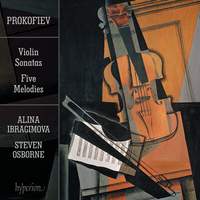Interview,
Alina Ibragimova on Ysaÿe
 Although she has yet to reach the age of 30, Alina Ibragimova's recorded discography is already extensive and would be the envy of many seasoned performers - chamber discs of Prokofiev and Schubert, a complete Beethoven sonata cycle on the Wigmore Hall Live label and more. For her latest disc she's turned to Ysaÿe's great tribute to JS Bach, his six unaccompanied sonatas Op. 27 (taking their cue from Bach's own sonatas and partitas - which Ibragimova has already committed to disc to great critical acclaim).
Although she has yet to reach the age of 30, Alina Ibragimova's recorded discography is already extensive and would be the envy of many seasoned performers - chamber discs of Prokofiev and Schubert, a complete Beethoven sonata cycle on the Wigmore Hall Live label and more. For her latest disc she's turned to Ysaÿe's great tribute to JS Bach, his six unaccompanied sonatas Op. 27 (taking their cue from Bach's own sonatas and partitas - which Ibragimova has already committed to disc to great critical acclaim).
I asked her about the way these two sets relate to each other across the centuries, and about the complex musical personality embodied in Ysaÿe's work.
These sonatas are each dedicated to a friend and musical colleague of Ysaÿe’s – Thibaud, Enescu, Kreisler and others – and your accompanying notes explore the ways in which these personal friendships find expression in the music. Do you find when playing them that these different personalities come across strongly in the music – and if so, do you think the cohesion of the whole suffers as a result?
I think that the different sonatas were very much suited to the players to whom they were dedicated, and you can almost hear their sound coming through the pieces - at least of those who we can still hear on recordings! I don't think the cohesion of the whole set suffers at all, as there's always the very personal and unique language of Ysaÿe's writing that binds them together. So while they're dedicated to individual - and very contrasted - players, you can feel his handwriting in every bar of the sonatas.
You mention that after a performance of Bach’s BWV1001, Ysaÿe and Szigeti were “led to wonder why no-one had followed in Bach’s footsteps”. Ysaÿe’s sonatas certainly break this centuries-old silence, but the question is still an interesting one; why do you think the solo violin sonata genre was left untouched for so long? Or are there works between Bach and Ysaÿe that for whatever reason we’re just not so aware of?
Of course there are Paganini's Caprices, and other romantic, very virtuosic solo pieces, both by Paganini and by Ernst; however, no one that I know of attempted to write anything like the large-scale works of Bach or Ysaÿe. It's not an easy thing to do - to write a solo violin piece that would give the illusion of the harmony and structure that composers were working with in the late eighteenth and nineteenth centuries: it takes a forensic knowledge of the instrument, and a remarkable compositional virtuosity, to make it work - which is what Ysaÿe does, of course!
These sonatas come from the very dawn of the era of recorded music, which means we have scraps of Ysaÿe’s own playing still available to us today. Since then, violin techniques have changed – portamento has fallen rather out of fashion, for example. When approaching these works, did you try to recapture something of the soundworld Ysaÿe would have known, or did you tackle them purely as a twenty-first-century musician?
I tried to do a little bit of both - of course we have to be aware of Ysaÿe's playing style and how he would have interpreted those pieces himself. However, in these pieces, there's a lot of room for improvisation and Ysaÿe leaves a great deal of freedom for the player, so every violinist coming to them brings their own touch, and their own personality, to all six sonatas.
You don’t appear to have recorded the Paganini Caprices (yet…!) but doubtless you’ve performed them many times. For you, how does the experience of performing unaccompanied works compare to playing with an accompanist or in a group?
I have only really played the Paganini Caprices when I was studying, and I look forward to approaching them again in a different context. Performing alone is very different to performing with other people: whilst with others you always have a dialogue, when playing solo you have to somehow find that dialogue within you and within the music.
Perhaps a more whimsical question – what do you think JS Bach would have made of Ysaye’s six sonatas?
He would have been shocked, I think, by the sound, colour, and pyrotechnics that the early twentieth-century violin - and these violinists - could produce. But then Bach's music is just as extreme, albeit in different ways.
Alina Ibragimova's recording of the Ysaÿe sonatas was released last week on Hyperion.
Available Formats: CD, MP3, FLAC, Hi-Res FLAC
Other recent recordings from Alina Ibragimova
Recorded when Alina was just 23, these sonatas and partitas helped cement her position as one of today's foremost violinists.
Available Formats: 2 CDs, MP3, FLAC
One of our favourites of 2014 here at Presto, and we're not alone in being wowed by Alina's Prokofiev double-bill. She brings out the differing personalities of two vastly different sonatas, ably assisted by Steven Osborne at the piano.
Available Formats: CD, MP3, FLAC, Hi-Res FLAC





